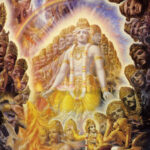Paramhansa Yogananda
“Thus is becometh us to fulfill all righteousness.”* In these words to John the Baptist, and in asking John to baptize him, Jesus was acknowledging the divine rights or his guru.
From a reverent study of the Bible from an Oriental viewpoint,** and from intuitional perception, I am convinced that John the Baptist was, in past lives, the guru of Christ. Numerous passages in the Bible imply that John and Jesus in their last incarnations were, respectively, Elijah and his disciple Elisha. (These are the spellings in the Old Testament. The Greek translators spelled the names as Elias and Eliseus; they reappear in the New Testament in these changed forms.)
(*Matthew 3:15.) (** Many Biblical passages reveal that the law of reincarnation was understood and accepted. Reincarnation cycles are a more reasonable explanation for the different states of evolution in which mankind is found, that is the common Western theory which assumes that something (consciousness of egoity) came out of nothing, existed with varying degrees of lustihood for thirty or ninety years, and then returned to the original void. The inconceivable nature of such a void is a problem to delight the herd of a medieval Schoolman)
Amazon #ads

The very end of the Old Testament is a prediction of the reincarnation of Elijah and Elisha: Behold, I will send you Elijah the prophet before the coming of the great and dreadful day of the Lord.”*** Thus John (Elijah), sent “before the coming… of the Lord,” was born slightly earlier to serve as a herald for Christ. An angel appeared to Zacharias the father to testify that his coming son John would be none other than Elijah (Elias).
(***Malachi 4:5.)
“But the angel said unto him, Fear not, Zacharias: for thy prayer is heard; and thy wife Elisabeth shall bear thee a son, and thou shalt call his name John… And many of the children of Israel shall he turn to the Lord their God. And he shall go before him**** in the spirit and power of Elias, to turn the hearts of the fathers to the children, and the disobedient to the wisdom of the just; to make ready a people prepared for the Lord.”*****
(****”Before him,” i.e. “before the Lord.”)(*****Luke 1:13-17)
Jesus twice unequivocally identified Elijah (Elias) as John: “Elias is come already, and they knew him not… Then the disciples understood that he spake unto them of John the Baptist.”****** Again, Christ says: “For all the prophets and the law prophesied until John. And if ye will receive it, this is Elias, which was for to come.”******* When John denied that he was Elias (Elijah),******** he meant that in the humble garb of John he came no longer in the outward elevation of Elijah the great guru. In his former incarnation he had given the “mantle” of his glory and his spiritual wealth to his disciple Elisha. “And Elisha said, I pray thee, let a double portion of thy spirit be upon me. And he said, Thou hast asked a hard thing: nevertheless, if thou see me when I am taken from thee, it shall be so unto thee… And he took the mantle of Elijah and fell from him.”*********
(******Matthew 17:12-13)(*******Matthew 11:13-14)
(********John 1:21)(*********II Kings 2:9-14)
The roles became reversed, because Elijah-John was no longer needed to be the ostensible guru of Elisha-Jesus, now divinely perfected.When Christ was transfigured on the mountain********** it was his guru Elias, with Moses, that he saw. In his hour of extremity on the Cross, Jesus cried out: “Eli, Eli, lama sabachthani? that is to say, My God, my God, why hast thou forsaken me? Some of them that stood there, when they heard that, said This man calleth for Elias… Let us see whether Elias will come to save him.”***********
(**********Matthew 17:3) (***********Matthew 27:46-49)




